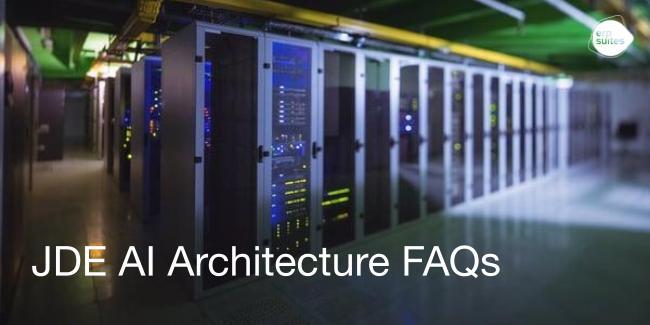Best Cloud for JD Edwards: AWS vs Azure vs Oracle | What You Need to Know
June 10th, 2025
3 min read
In this episode of "Not Your Grandpa’s JD Edwards," host Nate Bushfield and cloud expert Stewart Peterman from ERP Suites explore the critical factors businesses must consider when choosing a public cloud provider for JD Edwards ERP systems. Stewart shares practical insights on evaluating AWS, Azure, and Oracle Cloud based on real-world criteria, such as cost transparency, workload optimization, data egress fees, performance, and regulatory compliance. By the end of the episode, listeners will have a clear decision-making framework to confidently select the best cloud platform for their unique business needs.
Table of Contents
-
Introduction: Picking the Right Cloud Provider
-
Common Mistakes When Choosing a Cloud
-
Consequences of Poor Cloud Decisions
-
Key Criteria for Evaluating Cloud Providers
-
Comparing AWS, Azure, and Oracle Cloud
-
Why JD Edwards is Unique in the Cloud
-
Industry Trends in Cloud Adoption
-
Compliance, Legacy Infrastructure, and Hybrid Cloud
-
Next Steps: Evaluating Your Cloud Strategy
Transcript:
Introduction: Picking the Right Cloud Provider
Are you choosing a cloud provider based on a real strategy or just what your competitors are doing? In today's "Not Your Grandpa’s JD Edwards," I sit down with cloud expert Stewart Peterman to help you confidently navigate public cloud choices for ERP. By the end, you'll have a decision-making framework that protects performance, cost, and compliance.
Hello everyone, welcome back to "Not Your Grandpa’s JD Edwards." I’m your host Nate Bushfield. Today, I'm joined by Stewart Peterman, Enterprise Cloud Executive at ERP Suites. Stewart has helped numerous organizations balance performance, cost efficiency, and compliance when moving JD Edwards to the cloud.
Stewart, welcome. How are you doing today?
I'm doing great, Nate. It's great to be back!
Common Mistakes When Choosing a Cloud
With so many options, choosing a cloud platform can feel overwhelming. Why do so many companies feel stuck or confused when picking a cloud provider for JD Edwards?
Cloud selection is complex—pricing models, performance factors, integrations, security, and compliance requirements differ significantly among providers. Many companies struggle with these complexities, making it crucial to have objective, expert insight when choosing a platform.
What are common mistakes or misconceptions businesses have?
The biggest misconception is focusing solely on cost, rather than performance and security. Companies often misunderstand cloud pricing structures, underestimate data egress fees, or fail to recognize hidden costs and integration complexities.
Consequences of Poor Cloud Decisions
When cloud decisions go wrong, what issues typically appear first?
-
Cost overruns: Unanticipated data transfer or performance fees can cause significant budget impacts.
-
Security gaps: Misunderstanding the shared security responsibility can lead to data breaches or compliance failures.
-
Performance issues: Misconfigured services or inadequate provisioning can cause noticeable latency or downtime.
-
Integration failures: Problems integrating legacy applications with the cloud can severely disrupt daily operations.
Key Criteria for Evaluating Cloud Providers
When evaluating AWS, Azure, and Oracle Cloud, what technical and strategic criteria should businesses consider?
-
Workload-specific strengths: Choose platforms that align best with your ERP workload (e.g., OCI for Oracle databases, Azure for .NET applications, AWS for app development).
-
Cost transparency and simplicity: Clearly understand pricing models and potential hidden costs.
-
Data egress policies: Consider data transfer fees, which can greatly impact ongoing costs.
-
Support for automation and AI: Evaluate each provider’s tools for automation, predictive analytics, and AI capabilities.
Comparing AWS, Azure, and Oracle Cloud
How do these platforms compare specifically on cost transparency, data transfer fees, and ERP workload optimization?
-
Oracle Cloud (OCI): Best in cost transparency and data egress fees, optimized for Oracle databases, providing significant pricing advantages.
-
AWS: Highly mature ecosystem, strong for complex applications and integrations, though with complicated pricing structures.
-
Azure: Strongest for Windows and .NET workloads, excellent hybrid cloud capabilities, especially beneficial for compliance-heavy industries.
Each has unique strengths; selection should align closely with your business needs.
Why JD Edwards is Unique in the Cloud
What's different about cloud strategy when JD Edwards specifically is in the mix?
JD Edwards is a mature ERP, often heavily customized. Customizations can significantly affect cloud migrations, making assessments more complex. The underlying database (Oracle, SQL Server, DB2) also significantly influences platform choice, with Oracle Cloud offering optimization for JD Edwards workloads.
Industry Trends in Cloud Adoption
How does industry context shape cloud strategy? What are you seeing across different industries?
-
Financial Services: Medium adoption, cautious due to compliance needs; prefers hybrid deployments.
-
Healthcare: Medium adoption, driven by telehealth but cautious due to HIPAA compliance.
-
Manufacturing: High and accelerating adoption, driven by IoT, predictive maintenance, and supply chain optimization.
-
Retail & E-commerce: High cloud-native adoption due to scalability needs and seasonal demand.
-
Technology & SaaS: Very high adoption; predominantly cloud-native.
Each industry’s unique compliance and operational demands greatly influence cloud strategy.
Compliance, Legacy Infrastructure, and Hybrid Cloud
How do regulatory compliance, legacy infrastructure, and hybrid needs affect cloud selection?
Hybrid setups often suit companies with strict regulatory compliance requirements or extensive legacy infrastructure. Organizations must carefully assess which workloads stay on-premise for compliance, control, or cost reasons, and which benefit most from cloud migration.
Next Steps: Evaluating Your Cloud Strategy
If you're rethinking your cloud strategy, now’s the time. Visit ERP Suites and take the free cloud assessment. The ERP Suites team can help align your cloud decision with your business goals and technical requirements, ensuring you get it right the first time.
That's a wrap for this episode of "Not Your Grandpa’s JD Edwards." Huge thanks to Stewart Peterman for sharing invaluable insights. If this helped clarify your cloud decision-making, subscribe, leave a review, or share with your team.
Until next time, keep asking smart questions, challenge the status quo, and keep pushing JD Edwards into the future.
Video Strategist at ERP Suites
Topics:


